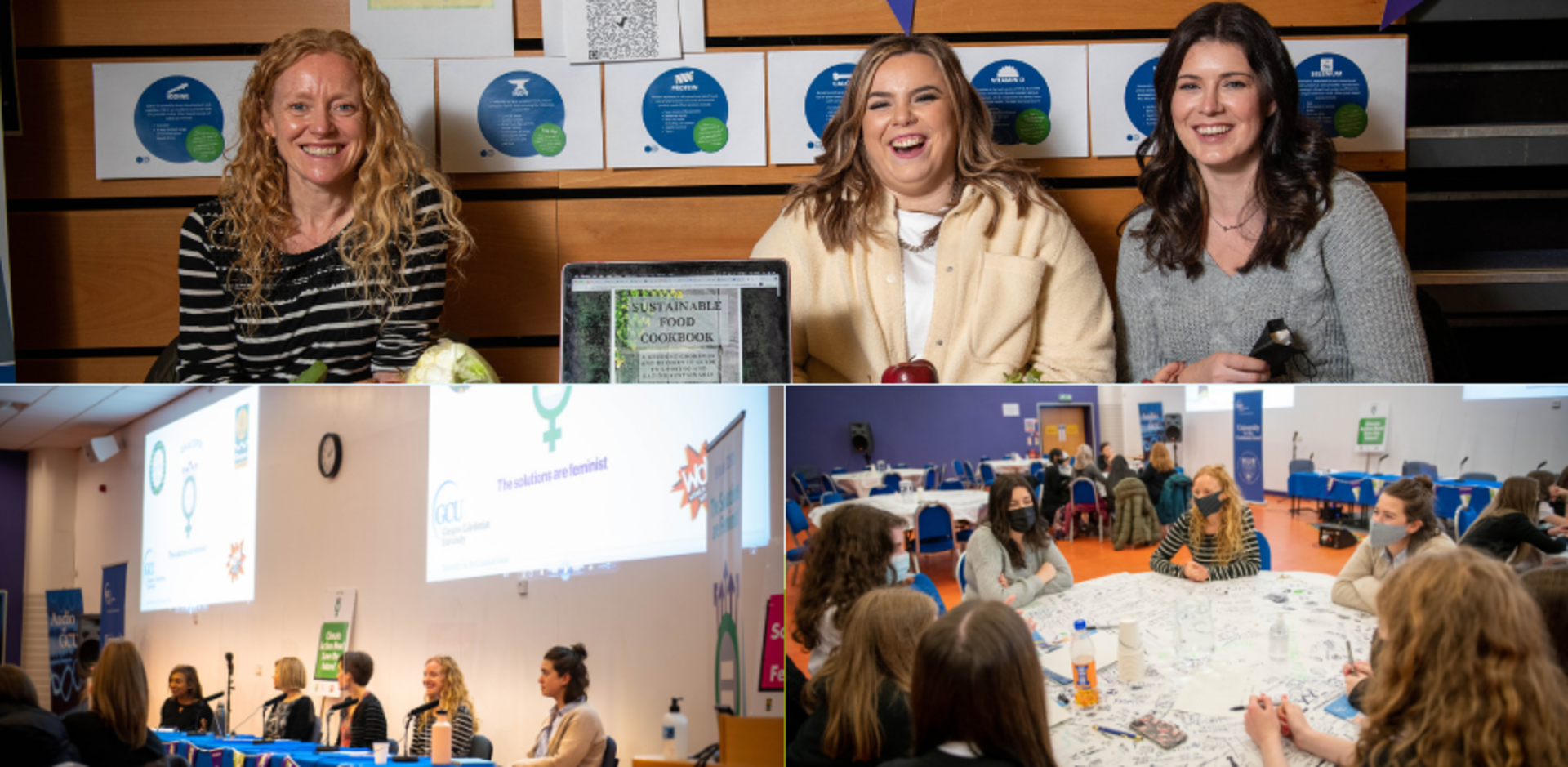'Eat less meat, save the planet', says GCU nutrition expert

Nutrition expert Emma Kinrade took centre stage today (4 November) at the high-profile Girls@COP26 conference to discuss how moving to a more plant-based diet can improve physical health and help save the planet.
Dietetics lecturer at Glasgow Caledonian University spoke to schoolgirls from across Glasgow about the benefits of cutting red meat and dairy products in reducing greenhouse gas emissions.
Emma, from the Department of Occupational Therapy, Human Nutrition and Dietetics, was joined by level three dietetics students Juliet Menabney and Hollie Smith at an events stall set up to answer any questions the girls might have on food and climate change.
She said: "During my discussion with the schoolgirls at the Girls@CO26 event I focused on improving both physical health and the health of the environment by promoting a move to a more plant-based diet.
"Meat, especially red meat and processed meat, and dairy products have the largest impact on the environment due to high greenhouse gas emissions and making small changes to our diets can help to reduce this for the future.
"A reduction in meat consumption and inclusion of more plant-based proteins such as beans, pulses, mycoprotein (Quorn products), tofu, soya, seeds and nuts can lead to big improvements in our own health and that of the environment.
"This does not necessarily mean switching to a vegan diet – just reducing the amounts of meat per week to no more than 500g or around 70g per day will make a difference.
"This is important to girls and women because of the key nutrients involved when reducing meat and dairy products and moving to a plant-based diet.
"I tried to reassure the girls that you can meet all your nutritional requirements (protein, iron, calcium, zinc, selenium, iodine) through a well-balanced diet that incorporates more plant-based proteins and fortified alternatives to dairy foods. Making these dietary changes now can mean a healthier and more sustainable future."
The Girls@COP26 – The Solutions are Feminist conference at Glasgow Caledonian University is designed to give young women in Glasgow a voice in the fight for gender equality to tackle global climate change.
The event was organised by Glasgow City Council (GCC), in partnership with GCU's Climate Justice Centre and Women of the World (WOW) foundation.
During the event the girls will debate different aspects of the climate emergency and discuss the global issues around our environment and gender – Sustainable Development Goal 5 - with local, national and international expert speakers.
To find out more about GCU at COP26, visit https://www.gcu.ac.uk/cop26.
Nutrition expert Emma Kinrade took centre stage today (4 November) at the high-profile Girls@COP26 conference to discuss how moving to a more plant-based diet can improve physical health and help save the planet.
Dietetics lecturer at Glasgow Caledonian University spoke to schoolgirls from across Glasgow about the benefits of cutting red meat and dairy products in reducing greenhouse gas emissions.
Emma, from the Department of Occupational Therapy, Human Nutrition and Dietetics, was joined by level three dietetics students Juliet Menabney and Hollie Smith at an events stall set up to answer any questions the girls might have on food and climate change.
She said: "During my discussion with the schoolgirls at the Girls@CO26 event I focused on improving both physical health and the health of the environment by promoting a move to a more plant-based diet.
"Meat, especially red meat and processed meat, and dairy products have the largest impact on the environment due to high greenhouse gas emissions and making small changes to our diets can help to reduce this for the future.
"A reduction in meat consumption and inclusion of more plant-based proteins such as beans, pulses, mycoprotein (Quorn products), tofu, soya, seeds and nuts can lead to big improvements in our own health and that of the environment.
"This does not necessarily mean switching to a vegan diet – just reducing the amounts of meat per week to no more than 500g or around 70g per day will make a difference.
"This is important to girls and women because of the key nutrients involved when reducing meat and dairy products and moving to a plant-based diet.
"I tried to reassure the girls that you can meet all your nutritional requirements (protein, iron, calcium, zinc, selenium, iodine) through a well-balanced diet that incorporates more plant-based proteins and fortified alternatives to dairy foods. Making these dietary changes now can mean a healthier and more sustainable future."
The Girls@COP26 – The Solutions are Feminist conference at Glasgow Caledonian University is designed to give young women in Glasgow a voice in the fight for gender equality to tackle global climate change.
The event was organised by Glasgow City Council (GCC), in partnership with GCU's Climate Justice Centre and Women of the World (WOW) foundation.
During the event the girls will debate different aspects of the climate emergency and discuss the global issues around our environment and gender – Sustainable Development Goal 5 - with local, national and international expert speakers.
To find out more about GCU at COP26, visit https://www.gcu.ac.uk/cop26.
